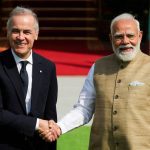The International Finance Corporation, the World Bank’s private sector lending arm, will nearly double its investment in agribusiness in Africa to $200 million during the 2009 fiscal year, a senior official said.
IFC director for global agribusiness, Oscar Chemerinsky, said the lender would continue to ramp up its agribusiness investments as part of efforts to help increase food production and supplies on the continent.
“We’re looking at doubling our investment from the past fiscal year to about $200 million in 2009 throughout the whole agribusiness supply chain,” Washington-based Chemerinsky told Reuters in an interview, adding it planned to raise its investment to about $400 million a year by 2011.
Read Also

Trade uncertainty, tariffs weigh on Canadian beef sector as market access shifts
Manitoba’s beef cattle producers heard more about the growing uncertainty they face as U.S. tariffs, and shifting trade opportunities, reshape their market.
In 2008 the corporation pumped $116 million into agribusiness companies in Africa as food shortages increased and prices soared, when many people on the continent could not afford the basics.
The IFC said it would seek to tap into Africa’s vast potential as a supplier of agricultural commodities, which was largely due to its rich farming land.
“Looking at the long term, Africa can become an important supplier of agricommodities to the world,” Chemerinsky said.
The high food prices last year and the global financial crisis has transformed the sector that long struggled with underinvestment but is now attracting new investors, including large investment funds.
“I think this crisis has had quite an important impact on our agribusiness operations and mostly in the type of operations we fund…the type of projects or sponsors that approach us and the type of investments that we are invited to participate,” Chemerinsky said.
“Demand, if anything, has increased for our services and we have to be very selective in terms of the type of investment which we choose to finance,” he said.
The IFC does not target individual farmers but works with banks in Africa to provide lending and technical support to growers and other agribusiness firms.
It has also started working with the Alliance for a Green Revolution in Africa (AGRA), headed by former UN chief Kofi Annan, to unlock credit and financing for small-scale farmers and agribusinesses across Sub-Saharan Africa.
Chemerinsky said the corporation would focus more on investments that would raise food output and supplies and could reduce the negative impact of further potential increases in food prices.














